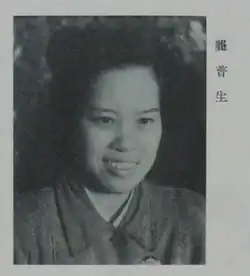Gong Pusheng
Gong Pusheng 龚普生 | |||||||
|---|---|---|---|---|---|---|---|
 Gong Pusheng | |||||||
| Born | September 1913 Shanghai | ||||||
| Died | 4 August 2007 (aged 93) Beijing | ||||||
| Nationality | Chinese | ||||||
| Occupation | Diplomat | ||||||
| Political party | Chinese Communist Party | ||||||
| Spouse | Zhang Hanfu (1905–1972) | ||||||
| Parents |
| ||||||
| Relatives | Gong Peng (sister) Xu Wanqiuc (sister) | ||||||
| Chinese name | |||||||
| Simplified Chinese | 龚普生 | ||||||
| Traditional Chinese | 龔普生 | ||||||
| |||||||
Gong Pusheng (龚普生) or Wade–Giles: Kung Pu-sheng (September 1913 – 4 August 2007) was a Chinese revolutionary activist and diplomat.[1]
Biography
Gong Pusheng was born in September 1913 in Shanghai.[2] Her father, Gong Zhenzhou, held several positions in the Sun Yat-sen’s government.[3] Her sister, Gong Peng, was also an activist and government official. In Shanghai she studied at St. Mary 's Episcopalian Girls' School, and continued her higher education at Yenching University.[4][5]
She joined the Chinese Communist Party in 1938.[6] On the advice of Zhou Enlai, she later attended Columbia University, in New York, where she established contacts with prominent people, including Eleanor Roosevelt, Pearl Buck, and Paul Robeson.[7][5]
In 1948 she became a member of the Human Rights Committee at the United Nations in New York.[3] After the establishment of the People's Republic, she was deputy director in the Foreign Ministry, in charge of International Organization and Conference Department.[8] She became director of the department in 1958. She became the first ambassador from the Peoples Republic to Ireland in August 1980.[7][9]She joined Chinese delegations to international conferences and undertook extensive visits abroad.
In 1949 she married Zhang Hanfu (1905 – 1972), also a senior diplomat.[7] Her sister Gong Peng also served in the Foreign Ministry.[1]
She died in Beijing on 4 August 2007.
In Popular Culture
Gong Pusheng is played by Lang Yueting in the film The Volunteers: To the War, in which she is depicted as a member the first delegation from the People's Republic of China to attend a United Nations Security Council meeting in November 1950. Also in this delegation, headed by Wu Xiuquan, was her brother-in-law, Qiao Guanhua.[10]
References
- ^ a b Lee, Lily Xiao Hong (8 July 2016). Biographical Dictionary of Chinese Women: v. 2: Twentieth Century. Oxon: Routledge. p. 179. ISBN 978-1-315-49924-6. Retrieved 10 May 2022.
- ^ Bartke, Wolfgang (18 June 2012). Who was Who in the People's Republic of China: With more than 3100 Portraits. Beijing: Walter de Gruyter. p. 116. ISBN 978-3-110-96823-1. Retrieved 10 May 2022.
- ^ a b Faligot, Roger (2019). Chinese Spies: From Chairman Mao to Xi Jinping. Oxford: Oxford University Press. p. 52. ISBN 978-1-787-38096-7. Retrieved 10 May 2022.
- ^ Wong, Wai Ching Angela (17 July 2018). Christian Women in Chinese Society: The Anglican Story. Hong Kong: Hong Kong University Press. p. 204. ISBN 978-9-888-45592-8. Retrieved 10 May 2022.
- ^ a b Lee 2016, p. 180.
- ^ Zheng, Yangwen (2017). Sinicizing Christianity. Leiden, Netherlands: BRILL. p. 69. ISBN 978-9-004-33038-2. Retrieved 10 May 2022.
- ^ a b c Lary, Diana (5 March 2015). China's Civil War. Cambridge: Cambridge University Press. p. 36. ISBN 978-1-107-05467-7. Retrieved 10 May 2022.
- ^ Lee 2016, p. 181.
- ^ Bartke 2012, p. 117.
- ^ Elley, Derek (5 November 2023). "Review: The Volunteers: To the War (2023)". Sino-Cinema. WordPress. Retrieved 22 August 2024.